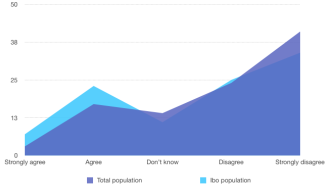
The Republic of Biafra predominantly represented the desires of the Ibo people to no longer be subject to the Northern-dominated leadership of the Federal Government of Nigeria at the time. However, 45 years later, the current protests of ‘pro-Biafrans’ for secession from Nigeria may no longer represent the aspirations of majority of the Ibo people, according to a survey by Volvs.
Efforts to oppose the secession of Biafra from Nigeria brought about the Nigerian Civil War (1967–1970), which subsequently led to the dissolution of Biafra. The Republic of Biafra predominantly represented the desires of the Ibo people to no longer be subject to the Northern-dominated leadership of the Federal Government of Nigeria at the time. However, 45 years later, the current protests of ‘pro-Biafrans’ for secession from Nigeria may no longer represent the aspirations of majority of the Ibo people, according to a survey by Volvs.
googletag.cmd.push(function() { googletag.display('content1'); });
When asked about their opinions of a Biafra state independent of Nigeria, a substantial majority of the respondents disapproved of the idea. Interestingly, respondents who were Ibos were more likely than the general population to oppose any idea that would lead to the creation of an independent sovereign Biafra state.
googletag.cmd.push(function() { googletag.display('content2'); });
These results may potentially reflect a sense of belonging and shared interests of the Ibo people with other ethnic populations in Nigeria, which may be evident in the inclusiveness of Nigeria’s entertainment culture, as well as the high rates of inter-state travels within the country for economic reasons.
Volvs also revealed that 50% of the respondents empathised with the proponents for the creation of a sovereign Biafra state. Perhaps, a substantial proportion of Nigerians believe that the Ibo people in Nigeria may have been marginalized over the years.
The results of this survey hold significant implications for governors of the South-Eastern states in Nigeria who have the responsibility of improving the living standards of the resident (Ibo) populations so that they feel less marginalized. The findings of this survey also hold implications for the leadership of the Federal Government of Nigeria which should reflect nationalism.
View full results at http://volvs.com/results/5
googletag.cmd.push(function() { googletag.display('comments'); });